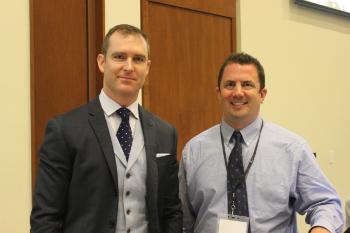The terrorist attacks of September 11, 2001 were an “inside job...” The science behind global warming has been invented... Vaccines cause autism...
On the Internet, in “fringe” media outlets, and in conversations across America, conspiracy theories abound. More than 50 leading scholars studying conspiracy theories came together at the University of Miami College of Arts & Sciences on Friday March, 13 (and Saturday, March 14) to answer key questions about conspiracy theories and the people who espouse them.
 |
| Joseph Parent (left) and Joseph Uscinski, associate professors of political science at UM and co-authors of American Conspiracy Theories. |
The conference was organized by Joseph Uscinski, associate professor of political science in the UM College of Arts & Sciences, and co-author of American Conspiracy Theories (along with UM’s Associate Professor of Political Science Joseph Parent). Researchers from eight countries, representing 35 universities and 15 disciplines, presented their work on this topic.
“This is the right time to bring scholars together to discuss our research on conspiracy theories. Over the past few months, the media has been full of tales of schemes and skullduggery, including fears of Ebola zombies, vaccination plots, and disappearing airplanes. This conference gave the opportunity for scholars to share their work which attempts to understand why people believe (or don’t) conspiracy theories,” Uscinski said.
Presentations were arranged in panels addressing broad themes: psychology, philosophy, culture, history, science, international conspiracy theories and motivated reasoning.
Selected papers included:
- Michael Butter, University of Tübingen, “Much Ado about Not Much: The Internet and the Alleged Proliferation of Conspiracy Theory.” Butter noted: “Even though they are still somewhat intellectual and popular, in the U.S. and Western Europe, conspiracy theories are much less so than in past cultures. Since the late 1950s/early 1960s, conspiracy theories have been deligitimized.
- Peter Knight, University of Manchester, “Conspiracy, Complicity and Collusion.” He said, “Conspiracies are like angels and aliens: different cultures see them differently. What counts as a conspiracy, both legally and culturally, has changed over time.”
- Ryan Neville-Shepard, Indiana University-Purdue University Columbus, “Beyond Paranoid Style: Subtextual Form in Modern Conspiracy Rhetoric.” “Myths give society structure, and oftentimes conspiracy theorists are rebelling against some of these myths.”
- Jesse Walker, books editor, Reason magazine, “What We Mean When We Say ‘Conspiracy Theory.’” Walker stated, “When mainstream stories and ‘fringy’ stories reflect each other, you have to look at it going both ways.”
- Ted Goertzel, Rutgers University, “Anti-Science Conspiracies of the Right and the Left.” Goertzel presented six scientists/intellectuals who have had a significant impact on conspiracy theories. For example, Nobel Prize-winning chemist Linus Pauling became convinced that vitamin C was an effective treatment for everything from colds to cancer late in life. He never did his own research on this topic, and remained unconvinced by other scientific evidence to the contrary, appealing directly to the public with no doubts to the matter.
- Josh Pasek, University of Michigan, “It’s not my consensus: When individuals know and reject the scientific majority.” Pasek presented his ongoing research study, which seeks to determine: how often people recognize the scientific consensus and then disagree with it; if these people have incorrect beliefs about the consensus; if they have correct personal beliefs about science; if they have personal reasons to disagree with science.
March 18, 2015

